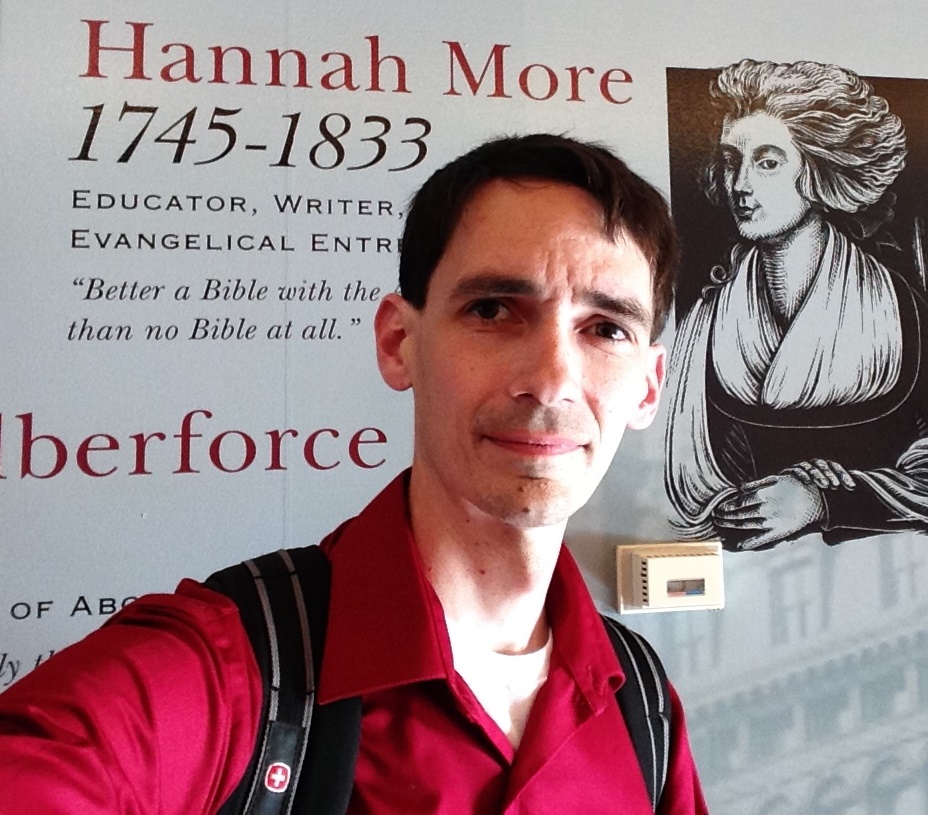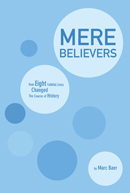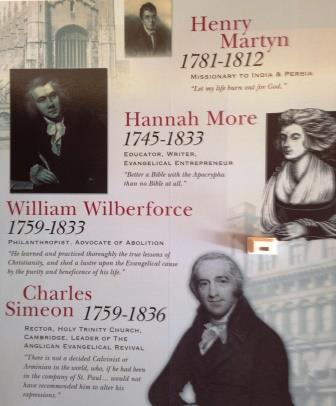William Wilberforce defined Christian as “a pilgrim travelling on business through a strange country.” — Marc Baer

Last week when registering for the 2014 Ancient Evangelical Future Conference at Trinity School for Ministry, I found myself surrounded by the testimony of many who have gone before us in Christ, including “Mere Believers” who I have enjoyed getting to know better through the work of Marc Baer (author interview). I confess that it has been quite some time since I visited Trinity School for Ministry and I was “moved” when entering this public display of “so great a cloud of witnesses” who cheer us as we press on with the race set before us in Christ Jesus our Lord (Hebrews 11-12). As I stepped into a stream of the history of the people of God, I was reminded that I am but “a dwarf standing on the shoulders of giants”. To God be the glory!
The picture to the right is part of a panel which gives attention to four who blazed the trail before us, including Hannah More and William Wilberforce. Marc’s chapter on Hannah More (1745-1833) in Mere Believers: How Eight Faithful Lives Changed the Course of History (Wipf and Stock, 2013) begins:

Hannah More was the most successful female author and arguably the most influential woman of her era. Selina Hastings anticipated her attempts to reform society; More was one of the original subscribers to Olaudah Equiano’s Interesting Narrative; and she was a close friend of William Wilberforce . . . “Who has heard of her now?” asks More’s latest biographer. The answer should be, all who wish to contemplate the application of courage to the quest for a more just society (41).
How do we come not only to know about “giants” such as Hannah More, but also how to understand/interact with what they wrote and accomplished in a life offered to the Lord?
Quite simply through “mere believers” such as Marc (and presenters at conferences such as 2014 Ancient Evangelical Future Conference) who offer their research, insights, and encouragement to the people of God. There is much I appreciated in Marc’s chapter on Hannah More, but I found particularly applicable to Emerging Scholars the call issued by John Newton to both Hannah More and William Wilberforce. What did he call them “to do” as Christians?
[B]elieve in the giver of the gifts and do the work of that righteous judge in the public sphere (45).
Marc concludes his chapter on Hannah More with an extended quote from her Practical Piety (1811):
. . . If God be the center to which our hearts are tending, every line in our lives must meet in him. With this point in view, there will be a harmony between our prayers and our practice, a consistency between devotion and conduct which will make every part turn to this one end, bear upon this one point. For the beauty of the Christian scheme consists not in parts (however good in themselves) which tend to separate views and lead to different ends; but it arises from its being one entire uniform, connected plan, “compacted of that which every joint supplies,” and of which all the parts terminate in this one grant ultimate point (62).

In the next chapter of Mere Believers, we read about William Wilberforce, who stated when 37 years old, “True Christians . . . are not their own”. Amen!
Note: As you may remember, Vinoth’s Ramachandra‘s vision of dialogic university ministry was shared at the 2012 Henry Martyn Lectures. With respect to others on this panel, I think it would be of significant benefit to dig into the life and ministry of Charles Simeon as we consider the call of Christians in higher education — placing that “in the queue”.
In addition to the Emerging Scholars Network’s author interview, don’t miss the book review written by Jennifer Woodruff Tait for The Well. To God be the glory!
7/4/2014 (9:20 am): Added Links to reviews.
Tom enjoys daily conversations regarding living out the Biblical Story with his wife Theresa and their four girls, around the block, at Elizabethtown Brethren in Christ Church (where he teaches adult electives and co-leads a small group), among healthcare professionals as the Northeast Regional Director for the Christian Medical & Dental Associations (CMDA), and in higher ed as a volunteer with the Emerging Scholars Network (ESN). For a number of years, the Christian Medical Society / CMDA at Penn State College of Medicine was the hub of his ministry with CMDA. Note: Tom served with InterVarsity Christian Fellowship / USA for 20+ years, including 6+ years as the Associate Director of ESN. He has written for the ESN blog from its launch in August 2008. He has studied Biology (B.S.), Higher Education (M.A.), Spiritual Direction (Certificate), Spiritual Formation (M.A.R.), Ministry to Emerging Generations (D.Min.). To God be the glory!

Here now we touch on that which no mortal can comprehend; that is the being of God. We must however, study that which our Father has provided of His Word and His Spirit. Defaulting to the accepted explanation places a slippage at every revelation of the person of God in His word so that the explanation supplants for the actual presentation of truth. In the first three verses of the 17th chapter of the Gospel written by John, Jesus speaks of Himself in the 3rd person. After the 3rd verse the existence within existence the Holy Spirit of God and the spirit of man speak of the New Covenant. In the 3rd verse the spirit of man distinctly speaks of the only God.
In John 18:35-37, Jesus says “Thou sayest that I am a king. To this end was I born, and for this cause came I into the world, that I should bear witness unto the truth. Every one that is of the truth heareth my voice.” Jesus, the only (be)gotten Son is the mediator of the Covenant with God before the foundation of the world. Heb 10:16-25, Rev 7:17, 22:1 Trinity?
Bob, Thank-you for sharing your reflections on “the being of God”. As time permits, please take a few lines to further unpack your understanding of “the being of God” — which differs from the “accepted explanation” (and the Trinity)? — and what spurs these comments in relationship to Surrounded by “Mere Believers”.